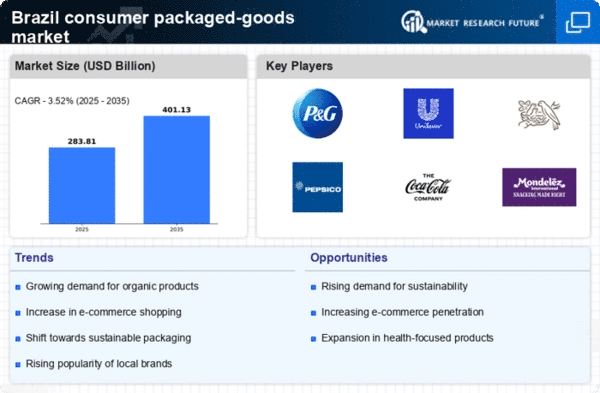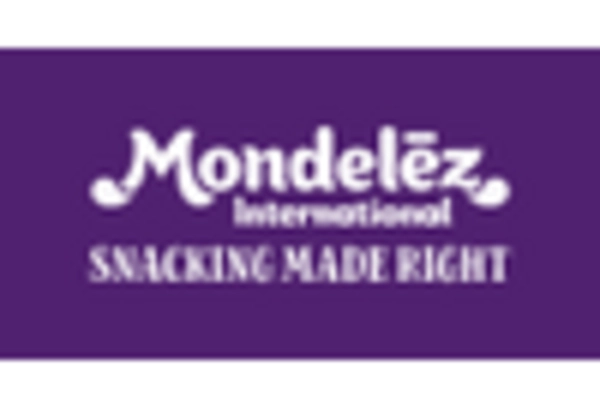Rising Middle-Class Population
The consumer packaged-goods market in Brazil is experiencing a notable shift due to the rising middle-class population. This demographic expansion is characterized by increased disposable income, which enhances purchasing power. As more consumers enter the middle class, they tend to seek higher-quality products, leading to a greater demand for premium goods. Recent data indicates that approximately 30% of Brazilian households now belong to the middle class, a significant increase from previous years. This trend is likely to drive growth in the consumer packaged-goods market, as these consumers prioritize convenience and quality in their purchasing decisions. Furthermore, the middle class's inclination towards brand loyalty may encourage companies to innovate and diversify their product offerings to cater to evolving consumer preferences.
Health-Conscious Consumer Behavior
Health-conscious consumer behavior is significantly influencing the consumer packaged-goods market in Brazil. As awareness of health and wellness increases, consumers are gravitating towards products that offer nutritional benefits. This trend is reflected in the rising demand for organic and natural products, which have seen a growth of approximately 15% in recent years. Consumers are increasingly scrutinizing labels and seeking transparency regarding ingredients, which is prompting manufacturers to reformulate products to meet these expectations. The shift towards healthier options is likely to drive innovation within the consumer packaged-goods market, as companies strive to align their offerings with the evolving preferences of health-conscious consumers.
Technological Advancements in Retail
Technological advancements are reshaping the consumer packaged-goods market in Brazil, particularly in retail. The integration of technology in shopping experiences, such as mobile payment systems and digital marketing, is enhancing consumer engagement. Retailers are increasingly adopting e-commerce platforms, which have seen a growth rate of over 25% in recent years. This shift towards online shopping is likely to continue, as consumers appreciate the convenience and variety offered by digital channels. Moreover, technology enables better inventory management and supply chain efficiency, which can lead to reduced costs and improved product availability. As a result, the consumer packaged-goods market is poised for growth as retailers leverage technology to meet consumer demands.
Urbanization and Changing Lifestyles
Urbanization in Brazil is a critical driver of the consumer packaged-goods market. As more individuals migrate to urban areas, lifestyles are changing, leading to increased demand for convenience-oriented products. Urban consumers often have busier schedules, which results in a preference for ready-to-eat meals and packaged snacks. Data suggests that urban areas account for over 85% of Brazil's GDP, highlighting the economic significance of these regions. This urban-centric lifestyle is likely to propel the growth of the consumer packaged-goods market, as companies adapt their strategies to meet the needs of time-constrained consumers. Additionally, urbanization fosters a culture of brand awareness, further influencing purchasing behaviors and preferences.
Influence of Social Media and Marketing
The influence of social media and marketing strategies is a pivotal driver in the consumer packaged-goods market in Brazil. With the proliferation of social media platforms, brands are able to engage directly with consumers, fostering a sense of community and brand loyalty. Approximately 70% of Brazilian internet users are active on social media, making it a powerful tool for marketing campaigns. This engagement not only enhances brand visibility but also allows for real-time feedback from consumers, which can inform product development. As brands increasingly utilize social media for promotions and consumer interaction, the consumer packaged-goods market is likely to see a shift in purchasing behaviors, with consumers more inclined to buy products endorsed by influencers or trending on social platforms.
















